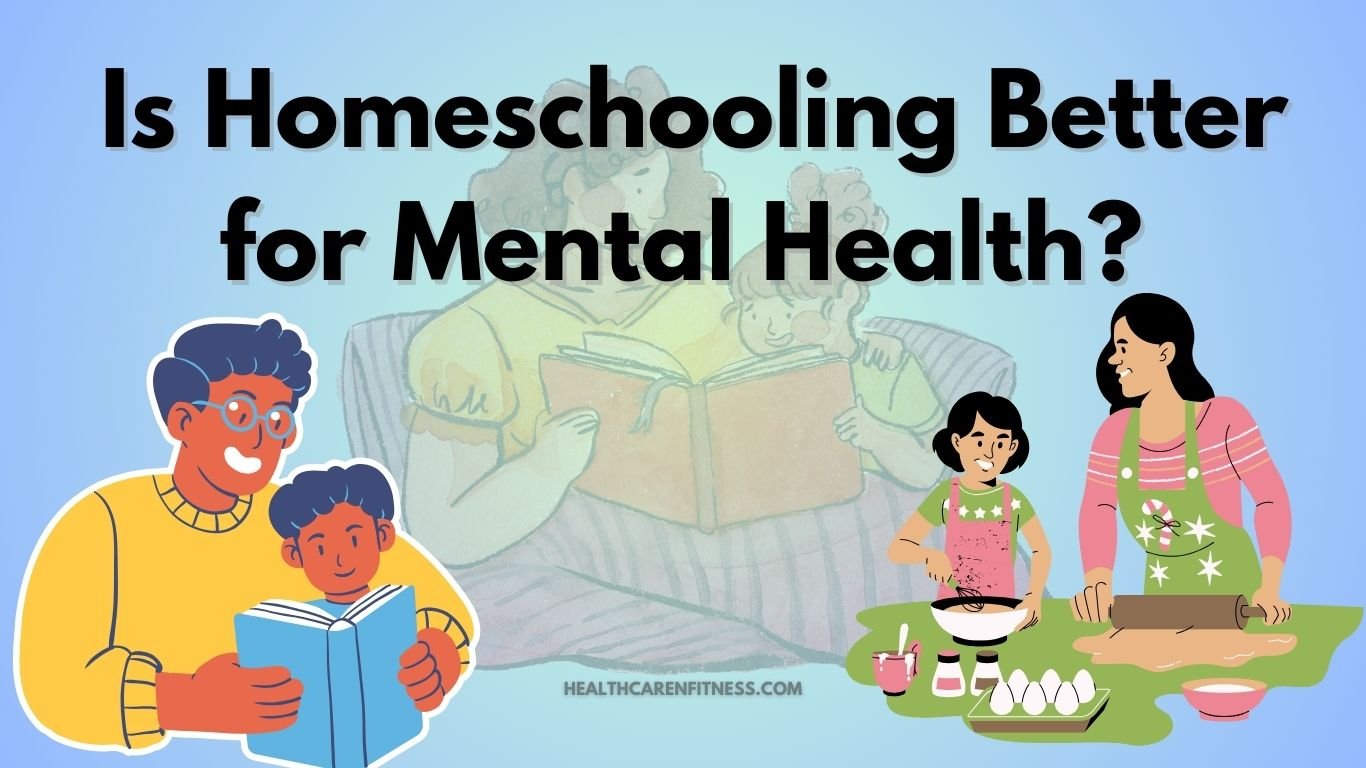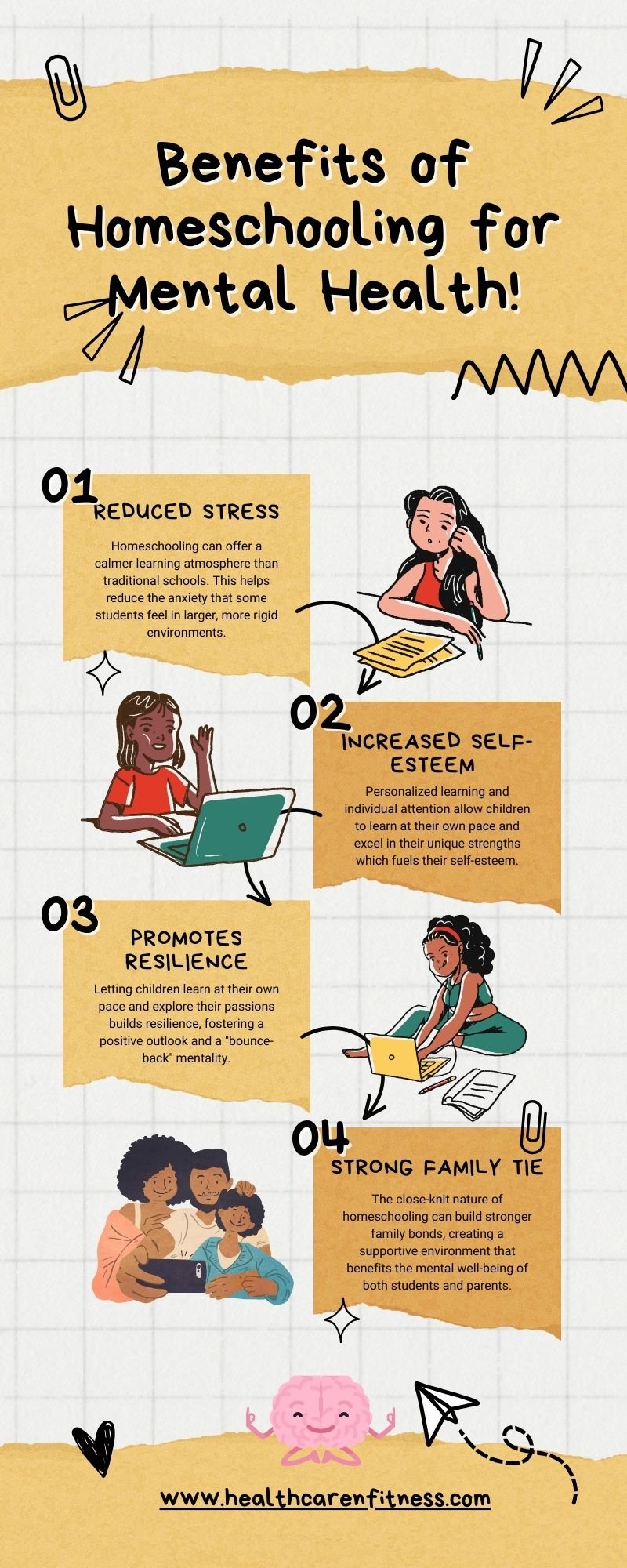
Introduction
Homeschooling has gained enormous popularity, with families attracted to its personalized learning and flexible approach. But questions revolve around its impact on mental health. Are children learning at home thriving or missing out on crucial social interaction?
This article explores both sides of the debate, examining the question, Is Homeschooling better for Mental Health? However, it also tackles concerns about social isolation and academic pressure. By delving into the complexities, we aim to provide families with valuable information and help them determine whether homeschooling is the right path for their children. Join us on this journey to explore the nuanced landscape of homeschooling and mental health.
Understanding Homeschooling
In homeschooling, parents become their children’s primary teachers, instead of sending them to a traditional school. This allows for a more personal and flexible learning experience, adapting to each child’s unique needs and interests, like a tailor-made suit.
Homeschooling has evolved over the years, transforming from a niche educational choice to a recognized and increasingly popular alternative. Families who participate in homeschooling often point to the benefits of closer family bonds, a personalized learning environment, and the ability to accommodate each child’s specific needs and interests.

Is Homeschooling Better for Mental Health? Let’s Explore the Key Points
1. Reduced Stress and Anxiety
Homeschooling can offer a calmer learning atmosphere than traditional schools. This helps reduce the anxiety that some students feel in larger, more rigid environments.
2. Customized Learning Environments
Learning environments tailored to individual needs can be more comfortable and accommodating, which can have a positive impact on mental well-being.
3. Personalized Attention
Homeschooling offers a personalized learning experience with individual attention, fostering confidence and increasing mental health.
4. Stronger Family Bonds
The close-knit nature of homeschooling can build stronger family bonds, creating a supportive environment that benefits the mental well-being of both students and parents.
5. Flexibility in Learning Styles
Homeschooling caters to individual learning styles, letting students explore subjects impactfully that spark enthusiasm for learning.
6. Greater Autonomy
Homeschooling allows children to take charge of their own learning, promoting independence and improving their mental health.
7. Freedom from External Pressures
Less pressure to conform in homeschooling can create space for authentic self-expression, potentially positively impacting mental health.
8. Emphasis on Emotional Intelligence
By emphasizing emotional intelligence and building awareness of feelings, homeschooling environments can nurture students’ mental well-being.
9. Opportunities for Real-World Learning
Homeschooling often incorporates real-world experiences into the curriculum, providing meaningful, hands-on learning opportunities that can positively influence mental health.
10. Supportive Socialization
While some worry about social isolation, homeschooled children can participate in social activities that focus on positive interactions, building supportive relationships and potentially enhancing mental health.
Challenges of Homeschooling for Mental Health
- Social isolation: Homeschooling can lead to social isolation if not carefully planned. To avoid this, make sure your child participates in social activities and is involved in the community. This will help them develop strong social skills and avoid feelings of loneliness.
- Academic pressure: Self-directed learning in homeschooling, while beneficial, can also create academic pressure and isolation. Children may struggle with responsibility and miss the social interaction of traditional school.
- Parental stress: Homeschooling takes time, patience, and energy, which can overwhelm parents and lead to burnout. This stress can spill over, creating tension and negatively impacting family life.
- Limited resources: Homeschooling families often face difficulties finding resources and support, especially in rural areas. Limited access to educational materials, specialized professionals and social activities can create a challenging environment for both parents and children.
Balancing both the Benefits and Challenges
Homeschooling allows you to customize education to each child’s needs, stimulating both academic and emotional growth. Finding the right balance is critical to creating a thriving learning environment that fosters a well-rounded child.
Tips for Parents:
- Create a supportive environment that promotes concentration and eliminates distractions, promoting a positive attitude towards education.
- Set achievable academic goals based on your child’s learning pace and skills. This builds confidence and keeps them eager to learn.
- Make sure your homeschooled child has enough time to socialize. Join local groups, community events or classes. Social interaction is the key to emotional growth.
- Help your child make friends! Organize play dates or join groups for homeschooled children. Playing with others helps them learn social skills and feel like they belong.
- If you are concerned about your child’s progress or well-being, seek professional help. Educators, therapists and specialists offer personalized support and guidance to meet your child’s specific needs.
- Clap for both school wins and personal growth! Positive encouragement builds confidence and makes learning a joyful journey.
FAQ’s
Is homeschooling legal everywhere?
Homeschooling rules differ in each place. So, research and follow your local laws to avoid trouble.
Is Homeschooling a better option than high school?
Both Homeschooling and high school have their own benefits, however “better” option depends on each child’s unique needs and the family’s ability to provide a supportive and enriching learning environment.
Is homeschooling suitable for every child?
While homeschooling works well for some kids, it’s important to weigh individual needs and preferences before deciding.
How can parents manage the challenges of homeschooling and work simultaneously?
Juggling work and homeschooling takes planning, organization, and a strong support system – family, friends, or even online communities can help you thrive in this unique journey.
Is Homeschooling Better for Mental Health of Children?
Yes, Homeschooling is a good option for Mental Health of Children, as it creates a good environment for learning, without any stress and anxiety.
Conclusion
So the answer to the question, Is Homeschooling Better for Mental Health? It depends on various factors, as Homeschooling requires balancing academic and social-emotional needs. Parents can create a supportive environment, foster social connections, and seek professional guidance to ensure a fulfilling educational experience for their children.

